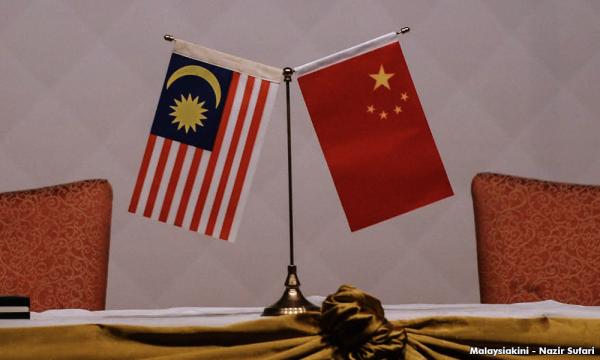A QUESTION OF BUSINESS | Malaysia’s sudden, new-found amour with China in a plethora of business deals worth hundreds of billions, coming in the wake of the 1Malaysia Development Bhd (1MDB) scandal where RM40 billion is at risk or already wasted, is tremendously worrying.
The huge amount of China borrowings that will accompany such deals, with delayed payment for up to seven years in some cases, will put the country in grave economic danger in the future as many of the infrastructure projects are not viable.
If some of the projects do not raise enough cash flow to start repaying the massive borrowings by the time payments are due, a great strain will be imposed on the country’s financial position and may even result in it becoming unable to meet its obligations, leading to default.
Already, the involvement of China state-owned firms in 1MDB-related projects such as buying power assets and taking stakes in property development ventures have raised legitimate fears that some of these may involve quid pro quo arrangements in other deals which may benefit China firms.
In other words, putting it bluntly, Malaysia may be giving China plum deals in return for help in covering the hole of over RM30 billion in 1MDB. More on that later but first, here’s a list of some mega deals made.
1. Purchase of 1MDB’s power assets for RM9.83 billion cash in November 2015. The purchase was made by China General Nuclear or CGN, putting power assets which were purchased from Malaysian private hands into a China state company. That rubbishes any claim that 1MDB was a strategic development company. The price was considered inflated, leading to speculation that other projects will go to China to compensate for this.
2. Purchase of 1MDB land for RM7.4 billion. Less than two months later, on New Year’s Eve in 2015, 1MDB sold a 60% controlling interest in Bandar Malaysia to a consortium comprising Iskandar Waterfront Holdings and China Railway Engineering Corporation, a China state company. The latter holds a 40% stake in the venture. This is a highly questionable deal surrendering control of one of 1MDB’s two flagship projects to others, including a China company, when there is enough local property development expertise. It lends credence to there being a quid pro quo deal with China.
3. China is expected to get high-speed rail project costing RM40-80 billion. The high-speed rail project between Kuala Lumpur and Singapore is expected to go to a China firm despite international tenders being planned. Interestingly, the Kuala Lumpur terminus is at Bandar Malaysia.
4. The RM55 billion East Coast Rail Link (ECRL) project announced in November 2016. China will both fund and build this project which has a seven-year delayed payment provision. Essentially a double-tracking project linking the east coast states with the west, there has been no economic viability study on it. There are genuine fears that the construction cost is terribly overstated and it is unviable.
5. A proposed RM200 billion port development in Port Klang. China is supposedly in the running for this massive project if it does see the light of day. This is a long-term project which again may be unnecessary considering the number of ports being developed concurrently now.
6. The RM42 billion Melaka Gateway project in September 2016. This includes four islands - three man-made, in a RM30 billion deal with China companies - a port, a bulk-and-break terminal, ship building and ship repair, mixed development, shopping complexes, ferry terminals, marina and so on. Where is the demand for these going to come from?
7. The RM400 billion gross development value Forest City off Johor. This massive development on four man-made islands, which may eventually house 700,000 people, is being developed by a China company, effectively in a joint venture with the Johor sultan. Considering that it is a property development which local players could easily have undertaken, what is the rationale for bringing in yet a Chinese company into this...


